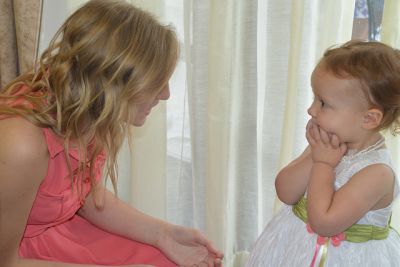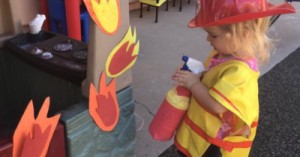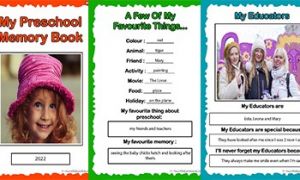Language plays an important role in a child’s development. It enables a child to communicate effectively with their family, learn at school, socialize with friends, build relationships with others and complete simple tasks such as talking on the phone and buying something from the shops.
As important as language is, it doesn't come easily to a child. The people surrounding them and their environment have significant impact on how a child’s language skills will develop.
By understanding a few simple techniques and strategies, these will ensure that a child’s language skills will improve during their early childhood which will give them the head start they need in being good communicators.
Strategies For Infants (0 - 12 months)
There are plenty opportunities within an infant’s routine where communicating plays a key role. During nappy changes, feeding times, bath times and play time, enables an infant to be exposed to language. Use this time to converse with the infant as they begin to learn the basics of communicating.
How to Encourage Language in Infants
- Pause when talking – or even when you are asking a question, just like you would do when taking to an adult. This will help the infant develop the understanding of taking turns in conversation.
- Encourage listening skills – make a variety of sounds from different parts of the room. Each time you make a noise wait for the infant to turn around and look to where the sound is coming from.
- Read stories – with feeling and expression. Alter your voice tone to engage the infant into the story.
- Chat - talk and comment about the things you see when you are outside or inside. Point out the colour of the grass or the size of the bus, talk about what you are doing etc.
- Name objects – like everyday objects. Researchers have shown that infants can understand a lot more then we realize. By naming everyday objects an infant may be able to pick up on the names of objects. Ask questions such as “where is the ball” and watch their eyes. If they understand they will begin to look for the object that you named.
- Picture Cards – show individual named picture cards, naming each picture as the infant looks at it. Only do this for a couple of minutes each day since you don't want to overload and they may lose interest quickly. See Flashcard Printables
- Copy sounds – when an infant begins to make sounds, copy them. This will encourage an infant to make more noises and different sounds and is the beginning of conversations.
- Discuss routine – talk about the everyday activities that the infant is involved in such as feeding times, play times etc.
- Use actions with words – wave as you say “bye bye”, when giving them their feeding bottle say “drink”, when lifting say “up” etc. This encourages an infant to relate language to what they see and do.
- Sing songs – this will encourage an infant with their communication and develop their attention skills..
Strategies for Babies (12 - 24 months)
During this stage, babies will begin to use language in a more recognisable way and even become more social. Language skills increase as a baby starts saying their “first word”. A first word could be a familiar name of a member of the family (mama or dada), a common object or even something that is said constantly around the home.
How to Encourage Language in Babies
- Noisy toys and books – will support a baby’s attention, interest and listening skills.
- Sing nursery rhymes – this will enable a baby to remember and understand words, get introduced to similar sounds and connect actions to songs. See Rhymes Posters in Printables.
- Talk about what you’re doing – simply describe the tasks you complete throughout the day with the baby. For example: if you’re washing your hands say something like “mummy is washing hands”. This will enable a baby to connect words to what is happening around them.
- Name object, baby sees – toys, clothes, everyday items, parts of their body and more. A baby will begin to memorize a word the more often they hear it.
- Repeat words – as a baby tries to say words support them by repeating it back to them also name items they are pointing at to begin expanding on their vocabulary.
- Read books – when reading the story, describe what is happening in the pictures. Name objects, colours, shapes, characters, places etc. See Mini Stories under Printables.
- Encourage short sentences – this can be done by expanding on what the baby says. For example, if baby says “milk”, you can say “more milk” or “milk please”.
- Be patient – sometimes you may not understand what a baby is trying to convey. Encourage them to use gestures when talking to gain a better understanding of what they are saying.
Strategies for Toddlers (2 – 3 years)
From here on, a toddler’s language skills will increase dramatically. They begin to use a variety of words to express themselves and start to communicate with others. It’s important to show a toddler how to use language in an appropriate way, such as taking turns in conversation and listening to others.
How to Encourage Language in Toddlers
- Encourage toddlers to talk – about events as they occur. Try not to wait until the end of the day as they may have forgotten about the incident. Toddlers are fascinated about what is going on around them and have an interest to speak about their experiences. Even as simple as getting dressed or going out to the park, toddlers will want to talk about it and you need to respond. It's important to remember a toddler will only understand simple language so, respond in words that they will be able to understand.
- Pretend play – it's important to introduce pretend play using toys. Set them up in a circle and talk to them or have a tea party. A toddler may be surprised at first but soon will realize that it's fun and will want to join in.
- Naming body parts – Make this as part of the daily routine. Start naming different parts of the body. Singing "Head’s Shoulder’s Knees and Toes" is a good way to introduce body parts as well.
- Play dates – arrange and organize a toddler to spend some time with other children around the same age.
- Singing songs – miss out the last word of familiar songs and rhymes and encourage the toddler to say the missing word.
- Demonstrate meaning – of new words in which isn't familiar with yet. Use actions such as, raising hands to describe height. Point to objects around the room and encourage toddlers to name them. Extend this to new objects that they haven’t named before.
- Use varied language – when talking to a toddler, instead of using the same words each time, say alternatives with the same meaning. For example, instead of “can you close the door” you could say “can you shut the door”.
- Use plurals – start using simple plurals by adding "s" at the end of words.
Strategies for Preschoolers (4 – 5 years)
Preschoolers will also begin to grasp basic language rules such as plurals and verb tenses and use them in every day speech. They string together four or five words to get their message across. Humour emerges, much of it revolving around language, reflecting the ability to go beyond the literal understanding of the spoken word.
How to Encourage Language in Preschoolers
- Show interest – a preschooler will begin to tell a number of stories. Listen and ask questions about the stories. This will show that you share an interest in what they say.
- Play dress up games – both boys and girls love dress up games as it provides them with an opportunity to develop their language skills because they can pretend to be a completely different person and act out different situations.
- Watching T.V – when a preschooler has finished watching their TV programme or a video ask a few basic questions about it.
- Emphasize your speech – help preschoolers to understand the meaning of different words by demonstrating them.
- Complex stories – preschoolers will listen and engage in a story that has more complex plots and characters in it.
- Provide explanations – preschools begin to develop an understanding of explanations about why they should behave in a certain way.
- Encourage eye contact – a preschooler’s attention will be greater if they are looking at you during conversation than somewhere else.
- Give instructions – make a request that contains two or three pieces of information, for example, “go into the kitchen and bring me the yellow cloth”.
- Play listening games – record different noises around the environment that a preschooler can identify or a familiar programme on TV, have them close their eyes, listen and name the different characters.
Strategies for School Age (6 - 8 years)
Good communications skills are now evident and school age children use language in many different ways such as sharing their views and opinions on a variety of topics and discuss their ideas. Language skills at this stage also help with learning to read.
How to Encourage Language in School Age Children
- Ask open questions - like "tell me something you liked about today", "what are you going to play with today?"
- Provide time - for a school age child to talk about their day.
- Play board games - that involve taking turns. This will help them to listen to instructions and concentrate for longer.
- Encourage children to talk - without being questioned. This can help them to talk more about their experiences. Ask questions that involve more than a yes or no answer.
- Introduce new words – supports child to expand on their vocabulary. See Learning Words Worksheets.
- Play word games with rhymes – this will encourage the skills needed for reading and writing. See Word Recognition Worksheets
- Give time – for school age children to respond to questions. Don’t answer for them or finish off their sentences.
It’s just amazing to see how many words a child picks up during their early childhood... yes it's true once a child begins talking, that's the end of it... they never stop! Try and encourage language skills by implementing some of the strategies that have been suggested.







 Open ended questions cannot be responded to with one word answers such as yes or no. These types of questions enables a child to provide
Open ended questions cannot be responded to with one word answers such as yes or no. These types of questions enables a child to provide During your child’s preschool years, an important milestone begins to emerge. This is the development of pre-writing skills. Pre-writing skills are used to encourage, develop
During your child’s preschool years, an important milestone begins to emerge. This is the development of pre-writing skills. Pre-writing skills are used to encourage, develop Open ended materials enables children to play freely. They are objects that have no rules to follow, use or function. Raw materials that can be
Open ended materials enables children to play freely. They are objects that have no rules to follow, use or function. Raw materials that can be An Acknowledgment of the Country is a way of showing respect for the Traditional Owners and can be given by both non-Indigenous people and Aboriginal
An Acknowledgment of the Country is a way of showing respect for the Traditional Owners and can be given by both non-Indigenous people and Aboriginal Language plays an important role in a child’s development. It enables a child to communicate effectively with their family, learn at school, socialize with friends,
Language plays an important role in a child’s development. It enables a child to communicate effectively with their family, learn at school, socialize with friends, Like adults, children have to deal with their own stress in life. Moving house, starting a new school, preparing for a new sibling - these are
Like adults, children have to deal with their own stress in life. Moving house, starting a new school, preparing for a new sibling - these are Playdough is such a versatile material. It provides numerous benefits to children as they manipulate it, it is safe and soothing and provides children with
Playdough is such a versatile material. It provides numerous benefits to children as they manipulate it, it is safe and soothing and provides children with Teaching children about sustainability enables them to appreciate and respect the natural environment. Early childhood services can provide meaningful hand on learning experiences in order
Teaching children about sustainability enables them to appreciate and respect the natural environment. Early childhood services can provide meaningful hand on learning experiences in order Recycling is an important concept that teaches children to care for the environment. It encourages children to be responsible and show a growing appreciating for
Recycling is an important concept that teaches children to care for the environment. It encourages children to be responsible and show a growing appreciating for Incursions provide children with the opportunity to explore meaningful learning experiences in the comfort of their early childhood service. The following provides a directory of
Incursions provide children with the opportunity to explore meaningful learning experiences in the comfort of their early childhood service. The following provides a directory of


